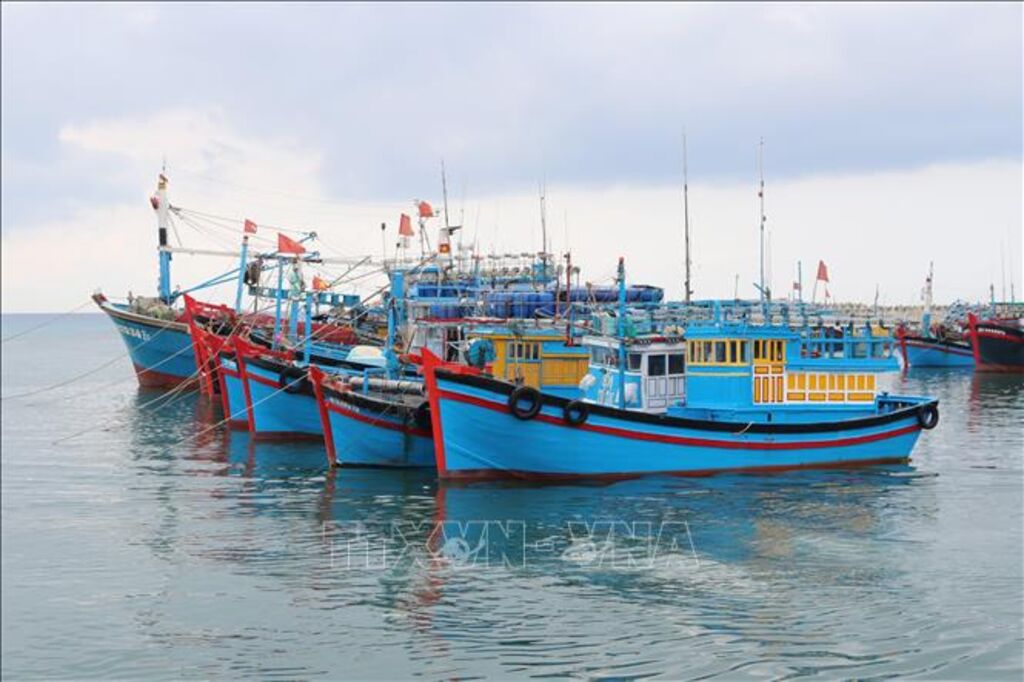 |
| Offshore fishing boats at My Tan fishing port, Khanh Hoa province__Photo: VNA |
Vietnam’s legal framework on fisheries establishes clear and comprehensive provisions for the prevention and handling of illegal, unreported, and unregulated (IUU) fishing. The 2017 Law on Fisheries serves as the principal legal basis defining prohibited acts and corresponding sanctions, while Resolution 04/2024/NQ-HDTP of the Justice Council of the Supreme People’s Court provides guidance on the application of the Penal Code in criminal proceedings related to IUU fishing. Together, these instruments ensure the consistency and effectiveness of law enforcement in protecting aquatic resources and upholding Vietnam’s commitments to sustainable fisheries governance.
Prohibited acts prescribed in the Law on Fisheries
Article 60 of the Law on Fisheries provides a detailed definition of illegal fishing, identifying specific acts that constitute violations of fisheries management regulations.
Accordingly, illegal fishing includes operating without a valid license; fishing in prohibited zones or during closed seasons; catching or transporting banned aquatic species; harvesting species below the minimum permitted size; or employing banned fishing gear and methods.
Other violations encompass the illegal exploitation of aquatic species listed as endangered, precious, or rare; unauthorized fishing in waters under the management of regional or foreign fisheries organizations; fishing in excess of permitted catch limits or beyond the licensed area and duration; and concealing, falsifying, or destroying evidence of violations.
The law also prohibits obstructing or resisting competent authorities during inspection and supervision; transshipping or assisting vessels already identified as engaging in illegal fishing, except in force majeure cases; failure to equip or properly operate required communication and vessel-monitoring systems; and operating without a valid food-safety certificate.
In addition, illegal acts include importing, re-exporting, transshipping, or transporting aquatic products of illegal origin through Vietnam’s territory; failing to record or submit fishing logs and reports as required; using unregistered or stateless vessels, or those flying the flag of a non-member state, to conduct unauthorized fishing in international waters; and violating rules on exploitation and conservation of aquatic resources in waters beyond national jurisdiction.
The law stipulates that organizations and individuals committing any of these acts are subject to administrative sanctions or criminal prosecution, depending on the nature and seriousness of the violation.
Criminal handling under Resolution 04/2024/NQ-HDTP
To ensure uniform application of the Penal Code in handling IUU fishing violations, the Justice Council of the Supreme People’s Court issued Resolution 04/2024/NQ-HDTP on June 12, 2024, effective from August 1, 2024. The Resolution provides detailed guidance on identifying and prosecuting criminal acts associated with the illegal exploitation, trade, and transportation of aquatic products.
Under this Resolution, individuals or organizations engaged in illegal fishing outside Vietnam’s territorial waters, or foreign nationals conducting unauthorized fishing within Vietnam’s waters, are prosecuted under Article 347 of the Penal Code (2015, as amended in 2017), with penalties ranging from fines to imprisonment of up to three years.
Acts of organizing or brokering illegal exit or entry for the purpose of unlawful fishing abroad are punishable under Article 348, carrying sentences of up to 15 years’ imprisonment, fines, and occupational bans. Facilitating such activities that result in fishermen’s illegal emigration or stay overseas falls under Article 349.
Violations of aquatic-resource protection regulations are sanctioned under Article 242, with penalties including fines of up to VND 1 billion, non-custodial reform, or imprisonment of up to 10 years. In cases involving endangered, precious, or rare aquatic species, offenders face harsher sanctions under Article 244, with potential imprisonment of up to 15 years and significant fines.
Legal entities may also bear criminal liability, including fines of up to VND 15 billion, suspension of business operations, or prohibition from conducting certain activities for up to three years.
The Resolution further identifies as criminal offenses such acts as tampering with vessel-monitoring systems, forging or using counterfeit documents to facilitate illegal fishing, and fraudulently legitimizing the origin of illegally caught aquatic products for commercial gain. These are prosecuted under relevant provisions of the Penal Code, including Articles 287, 341, 188, 189, and 198, with penalties ranging from monetary fines to long-term imprisonment depending on the gravity of the violation.
Through the combined enforcement of the Law on Fisheries and Resolution 04/2024/NQ-HDTP, Vietnam has built a solid legal foundation to prevent and punish illegal fishing activities. These instruments not only clarify the responsibilities and liabilities of individuals and organizations but also demonstrate the country’s determination to safeguard marine biodiversity, ensure lawful exploitation of aquatic resources, and fulfill its international obligations in combating IUU fishing.- (VLLF)









